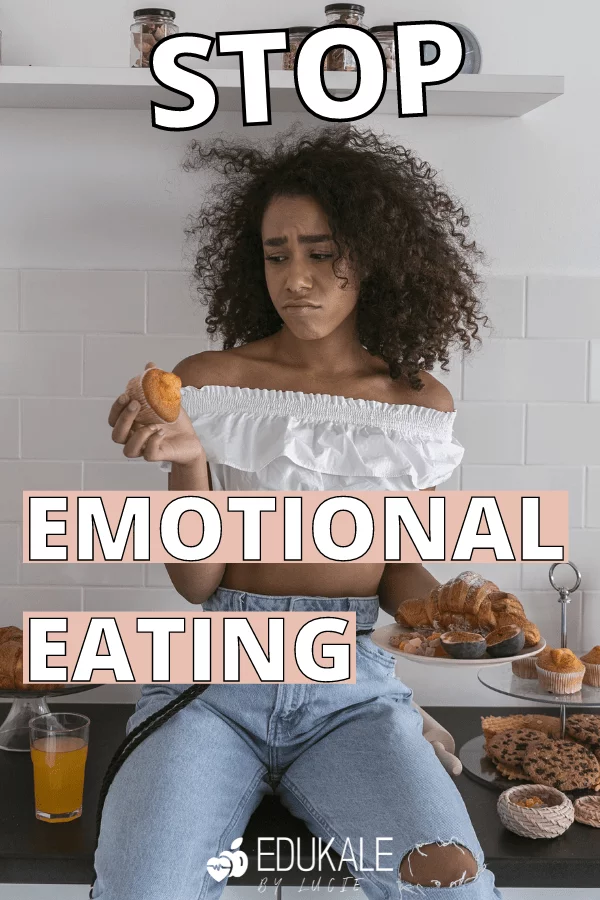This post contains affiliate links from which I may receive a small commission, at no extra cost to you. In no way does this affect my opinion or the information I provide on the product. Please read my disclaimer for more info.
Written by Lucie Villeneuve, nutritionist, M.Sc.
After a long and stressful day at work, it can be tempting to snack on cookies while scrolling through your phone or to order pizza while watching Netflix.
Turning to food for comfort is a very natural thing called emotional eating. This is when you crave food as a way to fill an emotional void rather than an actual physical one. It can really hinder your progress, cause you to feel powerless, and make you seek out how to overcome emotional eating for good.

What is emotional eating?
Emotional eating refers to eating for reasons other than physical hunger. Eating is used as a coping mechanism to face certain emotions like sadness, boredom, stress, loneliness, etc. Check out my article on how to prevent boredom eating for specific information on that!
Many things can trigger emotional eating: a stressful workday, an argument with a loved one, a financial worry…studies [1] show that it is associated with perceived stress and worries. Oftentimes, it is not associated with actual physical hunger: here are some ways to help you distinguish the two.
The differences between emotional hunger and physical hunger
Before you try to overcome emotional eating, it’s important to actually recognize when you are experiencing emotional hunger. It can hit you very suddenly and very intensely.

You often crave a specific food and feel an urge to satisfy that craving. This may bring you temporary comfort, but ultimately it often leads to feelings of guilt, shame, and regret.
On the other hand, physical hunger usually comes gradually and is accompanied by classic hunger signs (empty growling stomach, hunger pangs, low energy, headache, dizziness…) Usually it doesn’t involve craving a specific food and it goes away when you feel physically full and satisfied. It isn’t associated with any negative feelings either.
Sometimes, emotional hunger and physical hunger can overlap. For instance, if you have a long and stressful day and wait too long in between meals, you may feel emotional hunger on top of your physical hunger.
Keeping a food diary where you write down the foods you eat and how you’re feeling can also help you find a connection between your emotions and your food cravings. It’ll help you discern emotional hunger from physical hunger.
If you feel like it is truly emotional hunger that you are experiencing, here’s how to overcome it.
How to overcome emotional eating.
Eat full, healthy meals

The first and most important step is to actually give your body the nutrients it needs.
Sometimes, emotional hunger can be a form of compensation for the nutrition that you are lacking.
You might be having some food here and there and not sticking to a meal schedule. Or you could be having regular but super light meals. In these cases, it’s normal for your body to have certain cravings.
As I mentioned previously, if you don’t eat enough during the day and deal with emotional issues on top of that, you’re very likely to experience emotional hunger.
If you stick to three balanced and healthy meals a day and get in all of your macronutrients, it’ll be easier to spot when you’re eating emotionally and when you’re actually hungry. Read my article on how to eat healthy for beginners if you don’t know where to start!
Remove restriction
It’s important to let go of your restrictions and regulations regarding food, and to give yourself permission to eat the foods that you like.
If you give yourself too many restrictions, you’re going to give yourself excuses to break them, and emotional eating will be one of them.
This doesn’t mean that you should have all of your favorite comfort foods all the time, but that you can incorporate them into your diet in moderation.
For instance, if you have a nice meal of lentils, sweet potatoes, and broccoli, and finish it off with a cookie, that will diminish your chances of eating the entire box of cookies when you feel emotional hunger.
If no foods are off-limits and can be eaten as you pleased, you won’t automatically to turn to them for comfort.
Practice mindful eating
When you’re experiencing emotional eating, chances are you aren’t really focusing on your food. This will likely result in overlooking your hunger and fullness cues and overeating.
You should try eating more mindfully, which has been shown to reduce emotional eating by helping you control your impulses [2]. Mindful eating implies taking the time to think about the food you are consuming.
You can consider the health aspect and what the food will bring to your body. You can also consider the emotional aspect and whether these foods will satisfy your cravings.
I recommend using the hunger and fullness scale which enables you to assess your hunger levels before and after your meals. This will help you be more in tune with your body’s physical signals instead of giving in to your emotional ones. Here’s an article I wrote on the intuitive eating hunger scale if you want more information.
Finally, an important aspect of mindful eating involves focusing solely on the food you are eating, without any distraction. You should take the time to sit down at a table and chew each bite thoughtfully, noting the different aspects and taste. This should implicate all 5 senses.
Check out my article on mindful eating for more tips !

Make room for self-care
Nurturing yourself on a regular basis can definitely help when it comes to managing your emotions. This can vary greatly for each person, but a few common ways to practice self-care may include taking a nap, doing something creative, taking a bubble bath, calling a friend, listening to music, going on a walk, following a skin-care routine, holding a pet…
Emotional eating can be your body’s way of telling you that it needs to be taken care of. Try to do at least one daily act of self-care. It doesn’t need to be anything big— just take a short moment to check in with yourself.
Find other ways to cope with your emotions
Eating can be one way to cope with your emotions, but it shouldn’t be the only one. It’s important to learn other ways to do so (which is easier said than done, I know!)
This can look different for everyone, but here are a few tried and true ways:
- Meditation has a lot of proven health benefits [3]. Take some time to work on yourself, lower your stress levels, improve your peace of mind, and care for your mental health by meditating. You can find some guided meditations on YouTube or on certain apps. If you can’t find the time to meditate, taking a few very deep breaths regularly throughout the day while fully being in the present moment can be a good start.

- Journaling can also be a great way to express your emotions, and can actually improve healing. Studies [4] show that expressive writing about upsetting life events or daily activities was able to improve wound healing! Writing about emotional events results in improvements in both physical and psychological health [5]. Why not give it a try to help cope with your emotional eating?
- Positive daily affirmations can be more powerful than you think. They are a way of maintaining a positive attitude and letting go of negative beliefs. When you feel a negative emotion, self-affirmations can restore your perceived self-worth and value, making you feel better and more positive [6]. Try to fit in a few minutes of positive words of affirmation in your daily routine.
Make a list of activities that bring you joy
Sometimes, we turn to eating simply because we are bored, lonely, and don’t know what to do. We hope to find immediate pleasure and gratification from food.
Instead, try to find other activities that bring you joy. I really suggest writing them down and keeping that list in an accessible place so you know your options when the emotional eating strikes. Reading, watching a movie, dancing, roller-blading, playing video games, walking your dog, painting, listening to music, learning a new skill, seeing a friend, playing an instrument…There are so many other activities to try!

Why emotional eating can be ok.
Even if emotional eating can be frustrating, it’s important to remember that humans are emotional creatures and that eating with emotion is totally normal. It should just be seen as one way among others to deal with a frustrating or overwhelming day.
Some days, you may feel like ordering tacos and watching your favorite tv show after a stressful event, and other days you may prefer to dance to your favorite music or meet up with a friend. The goal is for emotional eating to be one of your coping mechanisms instead of the only one.
When you do end up emotional eating, it’s important to remove any feelings of guilt that may arise afterward. You shouldn’t see it as something negative, but rather as the intentional way you chose to deal with your emotions.
Usually, emotional eating leads to eating foods viewed as comfort foods, and that’s ok. It’s important that you don’t label these foods as bad foods and that you make room for them in your diet, with moderation, of course! This is why it’s also important that you stop putting restrictions on certain foods, as I mentioned previously.
You can read my article on dealing with food guilt for more tips as well !

How to overcome emotional eating in conclusion.
Emotional eating, meaning eating for reasons other than physical hunger, is used as a coping mechanism to face certain emotions like sadness, boredom, stress, loneliness, etc.
It’s important to learn how to discern emotional hunger and physical hunger, and to find other ways than food to cope with your emotions. Eating more mindfully, letting go of food restrictions, and making room for self-care and enjoyable activities can also help.
If you’re interested in nutrition, its impact on our health, and the science behind it, you should definitely read How Not to Die. In this book, Doctor Michael Greger, founder of Nutrition Facts, examines the top causes of death in America and explains how your diet can prevent— and in some cases even reverse— them. His advice is all backed by science and he writes in a very clear and entertaining way. This book isn’t a list of what you already know. It will teach you the keys to living a long healthy life, in a simple and practical way, and without spending fortunes on supplements and pills!
PLUS if you want to take it a step further, you can check out the How Not to Die Cookbook to implement the advice easily!


